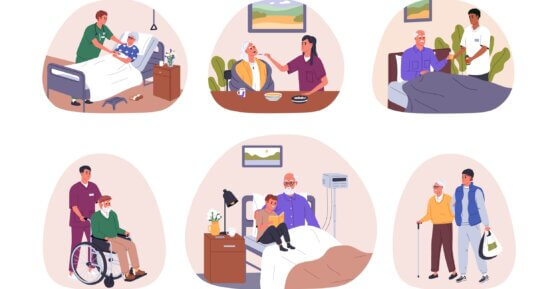
Page contents
- What is respite care?
- How much does respite care in a care home cost?
- Benefits of care home respite
- Mandy and Maggie’s story
- "When I collected her from Juniper she looked like my mum again"
- Who arranges respite care in a care home?
- Funding respite care
- Charities and grants
- Self-funding respite care
- Free of charge respite services
Page contents
- What is respite care?
- How much does respite care in a care home cost?
- Benefits of care home respite
- Mandy and Maggie’s story
- "When I collected her from Juniper she looked like my mum again"
- Who arranges respite care in a care home?
- Funding respite care
- Charities and grants
- Self-funding respite care
- Free of charge respite services
What is respite care?
Caring for a loved one is a difficult role and whilst rewarding in many ways, it can be taxing on your physical, mental, and financial wellbeing.
Respite care refers to a short-term break from caring responsibilities. This could be anything from a couple of hours to a few weeks and gives carers a chance to run errands, go to work, or just have some time to themselves.
Many care homes offer respite care in the form of short term stays which are usually planned in advance.
How much does respite care in a care home cost?
On average, it’s estimated that respite care costs around 10-15% more than residential care, with respite nursing dementia care totalling up to £1500 per week for people funding their own care. The amount you’ll pay will be determined by factors including your needs, where in the UK you live and the specific care home you choose.
Benefits of care home respite
There are many benefits to respite care in a care home.
- If a permanent move to a care home is a possibility in the future, a short-term stay will give the person a chance to experience what life is like in a residential setting and help them decide if they might enjoy living there in the long-term.
- Staying in a care home allows the person you care for to meet new people and enjoy a different environment. While providing care is a difficult task, being the person who requires care can be equally challenging. Many people may feel guilt for receiving care from a loved one, or isolation if they are no longer able to do things independently. Being in a dedicated setting could be a positive change for them, even on a temporary basis.
- Being in a care home guarantees that the person will have a team of carers on hand at all times. This can be preferable to home care services which tend to be scheduled for certain time periods throughout the day/week. Round the clock care will give you the peace of mind you need to relax and enjoy your break.
Respite care in a care home is also a good option if you need care over a certain period of time. For example, if you provide care for an elderly parent and also have children, you might want or need some time away from your caring responsibilities during the summer holidays so that you can spend time with your children. This can be pre-arranged with your chosen care home so you can guarantee your loved one’s place ahead of time.
Mandy and Maggie’s story
When Maggie, who lives with Alzheimer’s, needed increasing support at home, her daughter Mandy, who works as a healthcare assistant, said their relationship became strained. Home carers visited several times daily, with district nurses administering insulin for her diabetes, but Maggie often refused support and medication. Overnight, Mandy went from being a daughter to a carer.
“Running around changing bedding, rushing about and not having any quality time with mum. I could be there for two hours and not once sit down with her. You don’t realise it at the time, but she was starting to resent me.”
In desperate need of a rest, Mandy booked a respite care break for Maggie at Juniper House Residential Care Home in Worcester. Just 10 days later she couldn’t believe the transformation!
“When I collected her from Juniper she looked like my mum again“
“Mum was delighted – she’d been singing and listening to music and was telling me how lovely it was. It gave me goosebumps because I could see she’d had a wonderful time. I was so relieved.”
Maggie returned home and Mandy said things immediately “nose-dived”. Maggie would refuse the support of her home carers and her daughter continually had to intervene, leaving her struggling to juggle being a carer, her work and finding time for her own children and grandchildren.
Mandy comments: “I wanted the best for mum, and it wasn’t working. She would sleep a lot and her mood would get really low. She needed that continuity that she had at Juniper.”
It wasn’t long before they decided Maggie would move into Juniper permanently, and now Mandy can relax knowing she is being cared for.
“She’s happy to be there and it’s so nice for her to be around people,” she says. “It’s amazing to have our mother-daughter relationship back, because I am not engrossed in her care – it’s so lovely to have a giggle together again just me and her!”
Who arranges respite care in a care home?
You can either arrange and pay for respite care yourself or your local council will arrange this for you if you’re eligible for support.
To arrange respite care yourself, contact local care homes that you are interested in to see if they have availability.
Think about the needs of the person you care for and the type of care services they require to help you narrow down your search, for example not all care homes offer nursing care.
You might also consider the facilities available, for example, a care home may have a great activities schedule for residents or a really nice garden, which may be beneficial if you are looking for respite care during spring or summertime.
Funding respite care
Local council
Your local authority may also be able to help you arrange and fund respite care. You should contact them and ask for a needs assessment. Once this assessment has been carried out, your council will be able to recommend a care home and tell you whether they will contribute towards the costs. This will be decided through a second assessment called a financial assessment (or a means test).
During the financial assessment, the council will look at your loved one’s capital, including savings and income to determine if they’re eligible for financial support. Bear in mind that because respite care is temporary, the value of your loved one’s property will not be taken into account.
If you’d like to choose a care home that costs more than the amount the council has agreed to pay, it may be possible for a relative or friend of the resident to pay a top up fee.
Remember that a care home isn’t the only option for respite care. If you’re eligible for funding, the council may also pay for things like day centres and respite holidays.
The council may also wish to carry out a Carers Assessment. This assessment will focus on the role of the carer to identify things that will help to improve their lives both in and out of their caring responsibilities.
Charities and grants
There are a range of charities that offer funding for different types of respite care. These charities fund all or part of the cost of respite care, depending on your circumstances and the schemes available, through grants which do not need to be paid back.
Revitalise Support Fund
Established by Revitalise, the Revitalise Support Fund aims to help carers and the people they care for to cover the cost of a break. Since it began, the support fund has provided over £125,000 in funding.
To receive funding, you will need to complete an application form and the team will assess your eligibility for the grant. In most cases, the Revitalise Support Fund will provide a portion of the cost of the break through a grant (which is not repayable), and you will be required to cover the remaining balance.
Visit the Revitalise website to complete the Support Fund application form.
The Florence Nightingale in Sickness Trust
The Florence Nightingale Aid in Sickness Trust provides grants to help people of all ages who are ill, convalescent, or disabled. This includes convalescent and respite care to give carers a short break from their responsibilities.
To be considered for a grant, the break must be taken with a registered specialist provider, such as Revitalise.
The amount of money given will differ depending on your circumstances and the type of break you are looking at.
Visit the website to find more information about how to apply for a grant.
Victoria Convalescent Trust
The Victoria Convalescent Trust (VCT) is a charity that provides grants to fund short breaks for people living in England and Wales who need convalescence, recuperative care, or respite care.
The amount of grant you receive will depend on your circumstances and the type of short break provided. If the break is for a whole family, the trust will usually provide grants towards the cost of self-catering accommodation.
The charity doesn’t accept applications from individuals so these must be completed by a health professional or other support worker. This can include a qualified health or social care worker, a Citizens Advice Worker, or the prison or probation service.
A full list of who can apply, as well as details of how to do this, can be found on the Victoria Convalescent Trust website.
Carers Trust
Carers Trust also offer grants to help with the cost of respite care. To receive this grant, you will need to apply through your local Carers Trust service. They can explain everything you need to know about who qualifies and can also help you to apply. They may also be able to let you know about other ways to pay for respite, as well as offer alternative support, such as helping you to apply for benefits.
The maximum grant given by Carers Trust is usually £300.
Self-funding respite care
Respite care is expensive and self-funding may not be an option for a lot of people. If this is something you’re able to afford, it’s a good idea to use a specialist provider to ensure that your loved one will continue to receive the same quality of care.
Examples of specialist providers include:
- Revitalise offers a range of breaks across the UK. This includes themed breaks, such as Alzheimer’s breaks, youth weeks and time for music.
- Age UK provides day centres where elderly people can spend the day with others whilst continuing to receive the care they need. Day centres aim to provide people a chance to socialise and have fun. They often include activities such as quizzes, arts and crafts and day trips. They are run by trained professionals, however, most tend to cater for people who require low levels of care. You can visit the Age UK website to find out more and contact your local centre.
Care homes are also a good option for self-funding as you can carry out your own research, visit different homes, and choose the option that best suits you and the needs of the person you care for.
Free of charge respite services
Some charities and trusts offer respite services for free, such as sitting services or befriending services, which give carers the chance to have some time to themselves without the cost of regular respite care.
In most cases, these services are delivered by volunteers who won’t typically be trained professional. This means that it may not be possible for them to provide specialised care services, such as personal care, but they will be able to offer general assistance, including preparing meals or helping the person to get outside. The services available to you will depend on where in the UK you live. Many free services are provided by local charities. For example, in South Gloucestershire, the Carers Support Centre provide a short break service for carers living in that area.
To find a care home near you, visit carehome.co.uk and enter your location. You can then use the respite care filter to see which care homes in your area offer respite care.
Find your ideal care home
- Explore a wide range of care options and facilities
- Read independent ratings and reviews
- Connect directly with care homes to book a tour and discuss your needs


